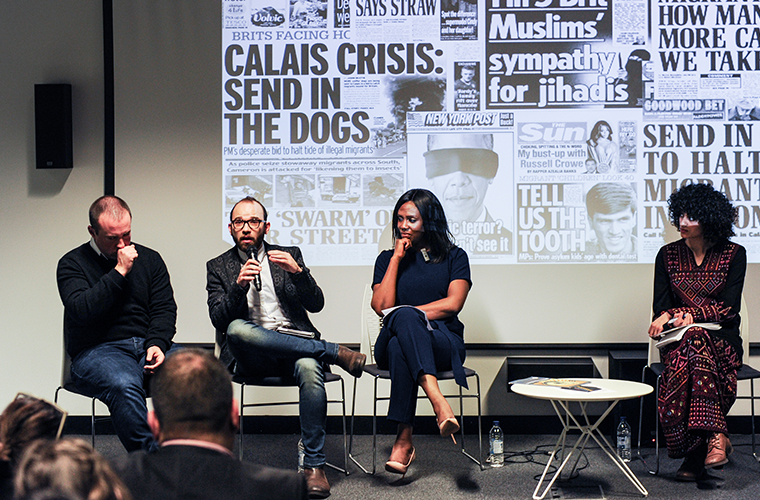Abdulwahab Tahhan (second from left) speaking on the Beyond Borders panel with (l-r): Tom Law, chair Claudia-Liza Armah and Shahd Abusalama. Image © Ana Escobar
LCC’s Beyond Borders exhibition (open 7-17 March 2017) and panel debate showcases the work of The Refugee Journalism Project, which supports migrant and exiled journalists from around the world to restablish their careers in the UK.
Project participant Abdulwahab Tahhan was raised in Aleppo, Syria and, now based in the UK, is a researcher at journalist-led transparency project Airwars, which monitors civilian casualties of international airstrikes in Iraq, Syria and Libya. We got in touch with Abdulwahab to find out more.
How did you first get involved with the Refugee Journalism Project?
In March 2015, I joined Amnesty International in London as a volunteer researcher for their Yemen team and maintained friendship with some contacts. The other volunteer researcher, who’s also a refugee from Yemen, was a volunteer as well at the MRC and recommended joining this project – and helped me apply for a position simply by sending me the application form.
What did you personally find to be the challenges in finding work as a journalist in the UK?
Finding a job as a journalist, or any other position I have applied for, requires very good connections who can recommend you to the hiring organisation directly. Being a refugee means you do not really know anybody in this country, and thus, breaking into such a competitive industry become a challenge, even if you have the potential, experience and required skills.
How did the Refugee Journalism Project help with these issues?
The organisers provided a couple of sessions and opportunities to network with the right people who are in a position to either hire you, as in my situation, or put you in touch with people who can recommend you to other people. It connected me to a wonderful mentor who has introduced me to many people and helped me with my career.

A visitor watches a video interview with Abdulwahab made by LCC graduate Sara Furlanetto, showing in the Beyond Borders exhibition. Image © Ana Escobar
You now work for Airwars and have produced a data journalism piece for the exhibition based on their data. Can you describe what people can expect to see?
The figures in my research are a bit shocking as they are not covered in the mainstream media. While the majority of the reports about Syria in western media is about ISIS, in fact, they don’t even make it to the podium of shame when it comes to the first three powers which kill civilians in Syria. The mainstream western media is being blinded by Islamic terrorism and tend to ignore the biggest terrorists; Assad and Russia. Maybe, just maybe, nowadays, the war against radical terrorism is tolerated even if civilians are paying the price.
What do you hope people visiting the exhibition take away from this piece?
The piece is only 700 words, so to be realistic, I expect people to have an idea about the figures of war from an independent and transparent body where we do not take sides. However, it is crucially important for the mainstream media in the UK to reflect these facts in their reporting and coverage of the war simply because for most of their audience, they are the one and only source of coverage.
You also took part in the panel debate. Why do you think public discussion and debate are important in relation to issues of migration?
Other than the obvious reason that I am a migrant myself, I have noticed the rise of the right wing negative rhetoric about migrants and I believe we need migrants’ voices to tackle this issue. It is good to see locals supporting migrants and talking about migration issues, but providing migrants’ views from migrants themselves would help immensely. It is difficult, if not impossible, to change people’s minds who have already chosen sides, but it’s always the undecided voters who make a real difference in the elections, and hence, public discussion would shed some light and help those who are not aware of the situation or haven’t yet taken the wrong side of the conversation.
Five years from now, what would you like to be doing in your professional life?
Five years ago, I never thought I would be here researching and writing about war in my country, so I hope in 5 years I wouldn’t have to write anymore about more victims of war, but hopefully working in a news organisation and producing authentic credible and honest reporting which reflects reality and does not take sides.
The Beyond Borders exhibition is free and open until 17 March 2017.


